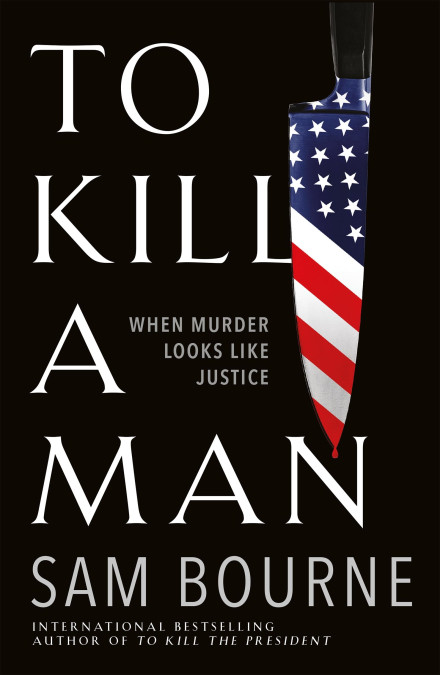Sam Bourne: To Kill a Man review – the woman who fought back | reviews, news & interviews
Sam Bourne: To Kill a Man review – the woman who fought back
Sam Bourne: To Kill a Man review – the woman who fought back
A highly improbably but immensely addictive thriller on the #MeToo fallout

Assassinate the President! Obliterate history by torching libraries and murdering historians! Crazy leaders and fake news are just a few of the subjects tackled by political journalist and thriller writer, Jonathan Freedland (aka Sam Bourne), in this, his fifth novel featuring the inventive, imaginative, intelligent trouble-shooter Maggie Costelloe.
Maggie – see her name – is Irish turned American. Aside from an off-again on-again Israeli partner, her only relative is her sister, a school teacher computer nerd, who lives a fairly normal life in the American South with (gasp) a husband and children. Maggie often does not see the wood for the trees, but when she does, she balances certainty with an appealingly attractive ambivalence – nowhere more so than in this political thriller based on the fall out from #MeToo. And what a fallout.
The focus of Bourne's latest novel is Natasha Winthrop, a feisty civil rights lawyer making her name in the cesspit of amorality, immorality, corruption and devious dealings that is Washington DC. Having been touted as a possible presidential candidate, in a truly unexpected and shocking opening, she suffers an attack at midnight in her own home. She manages to fight back in self-defence, but with fatal results. What at first is characterised as a victory for all women subject to violent sexual assault, quickly descends into accusations of murder. Inevitably, Natasha approaches Maggie.
 The novel operates on several levels. Instances of sexual assault thread the novel, as do horrifying statistics on the prevalence of (mainly) male on female violence. Yet Natasha is hardly as she seems. Events including the murder, the arrest, the potential political campaign, and Maggie’s investigation lend the novel persuasive power. But the hook for the entire mystery remains the assault. The authorial tone of icy anger renders horrifying statistics and anecdotes accessible. They remain hardly believable though we know them to be true. The realities for women, even in the affluent West (the developing world is not a focus) are the springboard for Natasha’s affirmative social media presence as the woman who fought back.
The novel operates on several levels. Instances of sexual assault thread the novel, as do horrifying statistics on the prevalence of (mainly) male on female violence. Yet Natasha is hardly as she seems. Events including the murder, the arrest, the potential political campaign, and Maggie’s investigation lend the novel persuasive power. But the hook for the entire mystery remains the assault. The authorial tone of icy anger renders horrifying statistics and anecdotes accessible. They remain hardly believable though we know them to be true. The realities for women, even in the affluent West (the developing world is not a focus) are the springboard for Natasha’s affirmative social media presence as the woman who fought back.
Natasha herself is a cool character and a true outsider in the race to become her party’s presidential candidate. Her chief rival, who seriously underestimates her, is the seemingly solid, liberal senator Tom Harrison who is revealed as a creep and worse. We discover (and this is truly smart) that Maggie’s investigations are a dry run for the inescapable spotlight and myriad investigations that will take place if indeed Natasha wins: she has hired Maggie to see how far she gets uncovering her own problematic past. This also puts her in danger. In the course of Maggie’s investigations, she too is followed by a violent stalker.
What Maggie uncovers is simultaneously plausible and deeply improbable – an extraordinary impersonation on Natasha’s part regarding her early life that calls her adult life in question, as well as the ways in which she has pursued her semi-hidden crusade against sexual violence and its consequences – including though vigilante women’s groups who take the law into their own hands. The normal suspension of belief that enables immersion in fiction wavers.
Bourne slowly reveals Maggie and Natasha’s characters through their interactions. Maggie begins to “read” Natasha as brilliantly manipulative. More would lead to spoilers, but the ways in which Maggie and Natasha interact is crucial and leads to an ending that is fascinatingly ambivalent.
Bourne’s plain yet beguiling prose makes this complex novel compellingly readable. His knowledge of Washington’s complex cityscape and its various tribes – the journalists, politicians, investigators and their agencies, lobbyists, indeed all its myriad denizens – makes us justly feel this fiction to be a true window into hidden realities. More, please.
- To Kill A Man by Sam Bourne (Quercus, £12.99)
- Read more book reviews on theartsdesk
The future of Arts Journalism
You can stop theartsdesk.com closing!
We urgently need financing to survive. Our fundraising drive has thus far raised £49,000 but we need to reach £100,000 or we will be forced to close. Please contribute here: https://gofund.me/c3f6033d
And if you can forward this information to anyone who might assist, we’d be grateful.

Subscribe to theartsdesk.com
Thank you for continuing to read our work on theartsdesk.com. For unlimited access to every article in its entirety, including our archive of more than 15,000 pieces, we're asking for £5 per month or £40 per year. We feel it's a very good deal, and hope you do too.
To take a subscription now simply click here.
And if you're looking for that extra gift for a friend or family member, why not treat them to a theartsdesk.com gift subscription?
more Books
 'We are bowled over!' Thank you for your messages of love and support
Much-appreciated words of commendation from readers and the cultural community
'We are bowled over!' Thank you for your messages of love and support
Much-appreciated words of commendation from readers and the cultural community
 Robin Holloway: Music's Odyssey review - lessons in composition
Broad and idiosyncratic survey of classical music is insightful but slightly indigestible
Robin Holloway: Music's Odyssey review - lessons in composition
Broad and idiosyncratic survey of classical music is insightful but slightly indigestible
 Thomas Pynchon - Shadow Ticket review - pulp diction
Thomas Pynchon's latest (and possibly last) book is fun - for a while
Thomas Pynchon - Shadow Ticket review - pulp diction
Thomas Pynchon's latest (and possibly last) book is fun - for a while
 Justin Lewis: Into the Groove review - fun and fact-filled trip through Eighties pop
Month by month journey through a decade gives insights into ordinary people’s lives
Justin Lewis: Into the Groove review - fun and fact-filled trip through Eighties pop
Month by month journey through a decade gives insights into ordinary people’s lives
 Joanna Pocock: Greyhound review - on the road again
A writer retraces her steps to furrow a deeper path through modern America
Joanna Pocock: Greyhound review - on the road again
A writer retraces her steps to furrow a deeper path through modern America
 Mark Hussey: Mrs Dalloway - Biography of a Novel review - echoes across crises
On the centenary of the work's publication an insightful book shows its prescience
Mark Hussey: Mrs Dalloway - Biography of a Novel review - echoes across crises
On the centenary of the work's publication an insightful book shows its prescience
 Frances Wilson: Electric Spark - The Enigma of Muriel Spark review - the matter of fact
Frances Wilson employs her full artistic power to keep pace with Spark’s fantastic and fugitive life
Frances Wilson: Electric Spark - The Enigma of Muriel Spark review - the matter of fact
Frances Wilson employs her full artistic power to keep pace with Spark’s fantastic and fugitive life
 Elizabeth Alker: Everything We Do is Music review - Prokofiev goes pop
A compelling journey into a surprising musical kinship
Elizabeth Alker: Everything We Do is Music review - Prokofiev goes pop
A compelling journey into a surprising musical kinship
 Natalia Ginzburg: The City and the House review - a dying art
Dick Davis renders this analogue love-letter in polyphonic English
Natalia Ginzburg: The City and the House review - a dying art
Dick Davis renders this analogue love-letter in polyphonic English
 Tom Raworth: Cancer review - truthfulness
A 'lost' book reconfirms Raworth’s legacy as one of the great lyric poets
Tom Raworth: Cancer review - truthfulness
A 'lost' book reconfirms Raworth’s legacy as one of the great lyric poets
 Ian Leslie: John and Paul - A Love Story in Songs review - help!
Ian Leslie loses himself in amateur psychology, and fatally misreads The Beatles
Ian Leslie: John and Paul - A Love Story in Songs review - help!
Ian Leslie loses himself in amateur psychology, and fatally misreads The Beatles
 Samuel Arbesman: The Magic of Code review - the spark ages
A wide-eyed take on our digital world can’t quite dispel the dangers
Samuel Arbesman: The Magic of Code review - the spark ages
A wide-eyed take on our digital world can’t quite dispel the dangers

Add comment